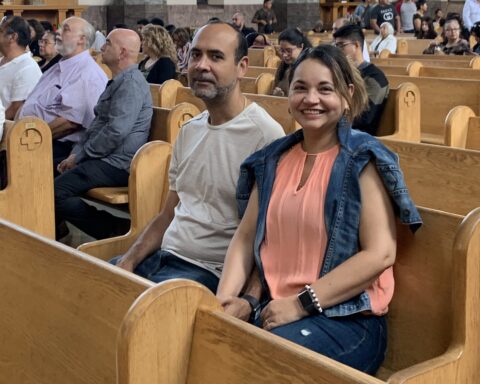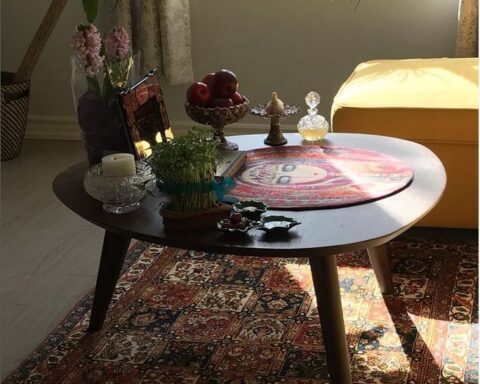The difference between empathy and sympathy was at the heart of the conversation on Sunday, May 31 at the Jaffari Community Centre in Thornhill.
Celebrating five years since the opening of the MARC (Mulla Asghar Memorial Library and Islamic Resource Centre), several faith-based communities and charitable organizations were invited to learn about Islam and the richness of other faiths in the latest exhibit “From the Roots of Abraham.” This was followed by an interactive discussion titled “Walk a Mile in Someone Else’s Shoes.”
“From the Roots of Abraham” is a unique exhibit that champions the roots of monotheism and fosters a common admiration of three major faiths: Christianity, Judaism and Islam.
“In this day and age of conflict around the world, it is very important that we upgrade the concept of tolerance of faiths to understanding of faiths,” stated Dr. Hasnain Walji, president of MARC.
“In this day and age of conflict around the world, it is very important that we upgrade the concept of tolerance of faiths to understanding of faiths,” stated Dr. Hasnain Walji, president of MARC.
Finding Empathy for Other Cultures
Panelists representing an array of faiths and cultures came together to discuss how we can shed the barriers that keep us from becoming human. The conversations were offered as a safe space, encouraging participants to question the way they empathize or sympathize with people in their lives.
Sylvia Sikakane, specialist in autism spectrum disorders, said that sometimes you do not need to offer anything to be empathetic. People want you to sit with them in their discomfort, be brave enough to be vulnerable and be emotionally open. “We can all cultivate the ability to empathize with people,” said Sikakane. “When you are in close proximity with someone in a caring way, it can boost the oxytocin levels in your brain that make both of you feel better.”
Why do we each have a desire to help others? If this is common among faiths, why do we focus on the differences?
Oxytocin is a natural chemical that is produced in the brain and has been known to help people better interpret the emotions of others. “A hug, for example, can build up your emotional intelligence as well as the emotional intelligence of the person with whom you’re empathizing and create a connection between the two of you,” she said.
Luci Anderson, director of campaigns at Mackenzie Health Foundation, explained that empathy is about effective listening and not placing judgment: “The moment you feel you are judging, you are no longer different from the person judging you.” Instead, she suggested thinking about their perspective and doing your best to educate them.
Focus on Similarities, Not Differences
Shishir Lakhani, entrepreneur and philanthropist, noticed that most people share a common passion for helping others. Why do we each have a desire to help others? If this is common among faiths, why do we focus on the differences? These were some of the questions raised.
“I believe that all of us only benefit when we grow a deeper understanding of one another’s diverse experiences, backgrounds and perspectives.” – Deborah Clark, event attendee
Firdaus Ali, health promotion specialist at the Heart and Stroke Foundation, compared the slums in India with life in Canada to demonstrate her point. “Empathy is when you feel with someone, and sympathy is when you feel for someone,” said Ali. People do not flinch at the level of human degradation in India. When she visits there, she personally feels sympathy for what she sees. However, in Canada, she feels empathy because, as she aptly put it, “we feel for each other.”
Deborah Clark, one of the attendees of the event, had an opportunity to view the “From the Roots of Abraham” exhibit prior to the interactive discussion and said she was glad she attended the program. “I believe that all of us only benefit when we grow a deeper understanding of one another’s diverse experiences, backgrounds and perspectives,” said Clark, who works in advancement at the University of Ontario in Oshawa. “Great gifts come out of a deeper understanding of other people’s backgrounds.”
Participants left the event feeling empowered. Walji used the NASA (U.S. National Aeronautics and Space Administration) slogan, “Do it. Do it right. Do it right now” to encourage people not to wait to empathize with others. Ali suggested we start by getting to know our neighbours whom many of us do not even know.
No discussion on empathy and sympathy is complete without mentioning Dr. Brené Brown’s work on human connection, vulnerability and authenticity. The group watched a short animated clip on the power of empathy bringing Dr. Brown’s words to life in a fun way, while also sparking serious self-reflection.
Participants also had an “Aha moment!” when Sikakane shared a twist on the golden rule, “Treat others the way you want to be treated,” which her mother taught her to consider: “Treat others the way they want to be treated.”




